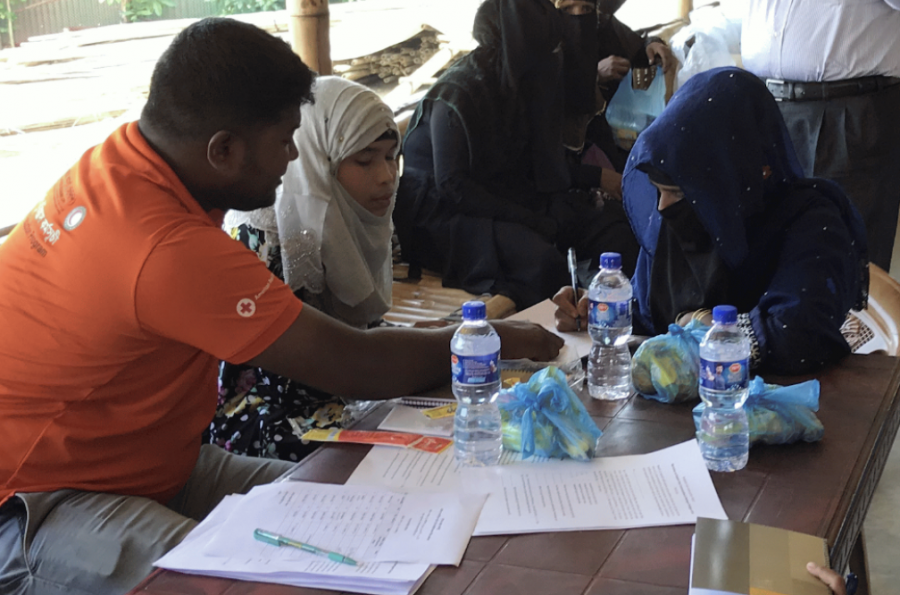To help victims of the Rohingya refugee crisis, NYU Steinhardt professor Raul Lejano created workshops on environmental disaster risk education, working with graduate students and non-governmental organizations.
“I grew up in the Philippines; every time there’s a big typhoon or cyclone, there’s always people stuck in their homes,” Lejano told WSN. “It’s a tragic thing that happens every year. Knowing this, I wanted to do something about it.”
Lejano said he took inspiration from his personal life to help those who are most prone to being victims of natural disasters such as storm surges from typhoons.
Nine months ago, the director of the Cyclone Preparedness Program asked Lejano if he could help create a workshop for victims of the Rohingya crisis. Beginning in the summer of 2017, more than 740,000 people from Myanmar fled to Bangladesh to escape violence. More than half of the displaced refugees are children, and almost all of them fled with nothing, making it even harder to deal with increasing natural disasters in Bangladesh, which regularly suffers from floods, cyclones, storm surges and tsunamis.
“We have 163 million people [in Bangladesh], we have a lot of poverty and scientists believe that we will eventually be underwater,” said Steinhardt graduate student Shahela Bugum, who works with Lejano. “The country is already unstable and it is hard for these million refugees who are escaping genocide to come to another unstable country.”
Bugum and Lejano used sandboxes to simulate what would happen during a post-typhoon storm surge, when large waves of water tumble down to destroy homes and injure people. The plastic boxes are filled with sand and are molded to simulate a certain environment or terrain and then filled with water to simulate different harsh weather conditions. This helps refugees better understand the process of these natural disasters and, subsequently, what to do when they happen.
Bugum said one of the main goals of the program is to get evacuation messages across in a way that people understood it.
Bangladesh is a nation with multiple dialects and where societal taboos have previously prevented women from evacuating during natural disasters.
“There are a lot of taboos regarding evacuations in Bangladesh women historically, were told to be kept at home and men would evacuate,” Bugum said. “In that sense there were a lot of tragedies regarding women. This is something we want to help out with and we have been doing.”
He said the workshops and toolkits attempt to help relay important messages of evacuation and safety despite these challenges.
The workshop is also meant to educate refugees about what happens during these natural disasters, including what happens in a mudslide, how rain falls over a period of a week and how water helps saturate the soil.
These workshops also focus on empowerment. The “Experience Sharing” workshop focuses on the discussion of shared experiences and allows refugees to open up about their personal lives. Lejano thinks it is important for those who fled towards safety, and lost much to do so, to feel like they have control over their lives once more.
In addition to helping the Rohingya crisis, Lejano’s work on environmental education has been present at the NYU Tandon School of Engineering and he hopes to bring it abroad as well. At NYU Tandon, the sandbox exercise has been upgraded to using 3-D virtual reality goggles to simulate floods and other natural disasters.
Lejano said it is difficult to measure the progress and effects of his workshops and training techniques.
“We have to rely on anecdotal evidence from people on the ground who actually experience the effects of climate change and live in the conditions,” Lejano said. “Only then can we better curate toolkits that address their needs.”
Despite the potential difficulties, Lejano said he feels equipping people with the knowledge of how to act in the face of these natural disasters is essential.
“The Rohingya are the some of the most vulnerable to all of these natural disasters as they do not have any control over basically anything due to their displacement,” Lejano said. “It’s important we provide people with proper education to help them.”
Correction, Dec. 5: A previous version of this article misattributed a quote said by Bugum to Lejano. The article has since been updated to reflect this correction and WSN regrets the error.
Email Julia Santiago at [email protected].


























































































































































